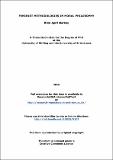Files in this item
Feminist methodologies in moral philosophy
Item metadata
| dc.contributor.advisor | Hope, Simon | |
| dc.contributor.author | Markey, Bren April | |
| dc.coverage.spatial | 214 p. | en_US |
| dc.date.accessioned | 2016-07-11T09:47:52Z | |
| dc.date.available | 2016-07-11T09:47:52Z | |
| dc.date.issued | 2016-06-23 | |
| dc.identifier | uk.bl.ethos.690336 | |
| dc.identifier.uri | https://hdl.handle.net/10023/9107 | |
| dc.description.abstract | This thesis develops a critique of the methodology of mainstream academic moral philosophy, based on insights from feminist and more generally anti-oppressive political thought. The thesis consists of two parts. In the first, I loosely characterise a certain dominant methodology of philosophy, one based on giving an important epistemological role to existing, 'pre-theoretical' moral attitudes, such as intuitions. I then argue that such methodologies may be critiqued on the basis of theories that identify these moral attitudes as problematically rooted in oppressive social institutions, such as patriarchy and white supremacy; that is, I identify these attitudes as ideological, and so a poor guide to moral reality. In the second part, I identify and explore of a number of themes and tendencies from feminist, anti-racist, and other anti-oppressive traditions of research and activism, in order to draw out the implications of these themes for the methodology of moral philosophy. The first issue I examine is that of how, and how much, moral philosophers should use abstraction; I eventually use the concept of intersectionality to argue for the position that philosophers need to use less, and a different type of, abstraction. The second major theme I examine is that of ignorance, in the context of alternative epistemologies: standpoint epistemology and epistemologies of ignorance. I argue that philosophers must not take themselves to be well placed to understand, using solitary methodologies, any topic of moral interest. Finally, I examine the theme of transformation in moral philosophy. I argue that experiencing certain kinds of personal transformation may be an essential part of developing accurate ethical views, and I draw out the political implications of this position for the methodology of moral philosophy. | en_US |
| dc.language.iso | en | en_US |
| dc.publisher | University of St Andrews | |
| dc.rights | Attribution-NonCommercial-NoDerivatives 4.0 International | * |
| dc.rights.uri | http://creativecommons.org/licenses/by-nc-nd/4.0/ | * |
| dc.subject | Ethics | en_US |
| dc.subject | Feminist philosophy | en_US |
| dc.subject | Transfeminism | en_US |
| dc.subject | Methodology | en_US |
| dc.subject | Abstraction | en_US |
| dc.subject | Intersectionality | en_US |
| dc.subject | Feminist epistemology | en_US |
| dc.subject | Ignorance | en_US |
| dc.subject | Transformation | en_US |
| dc.subject | Idealisation | en_US |
| dc.subject | Ideology | en_US |
| dc.subject.lcc | BJ1395.M2 | |
| dc.subject.lcsh | Feminist ethics | en_US |
| dc.subject.lcsh | Knowledge, Theory of | en_US |
| dc.subject.lcsh | Ignorance (Knowledge, Theory of) | en_US |
| dc.title | Feminist methodologies in moral philosophy | en_US |
| dc.type | Thesis | en_US |
| dc.type.qualificationlevel | Doctoral | en_US |
| dc.type.qualificationname | PhD Doctor of Philosophy | en_US |
| dc.publisher.institution | The University of St Andrews | en_US |
| dc.publisher.department | University of Stirling | en_US |
The following licence files are associated with this item:
This item appears in the following Collection(s)
Except where otherwise noted within the work, this item's licence for re-use is described as Attribution-NonCommercial-NoDerivatives 4.0 International
Items in the St Andrews Research Repository are protected by copyright, with all rights reserved, unless otherwise indicated.


